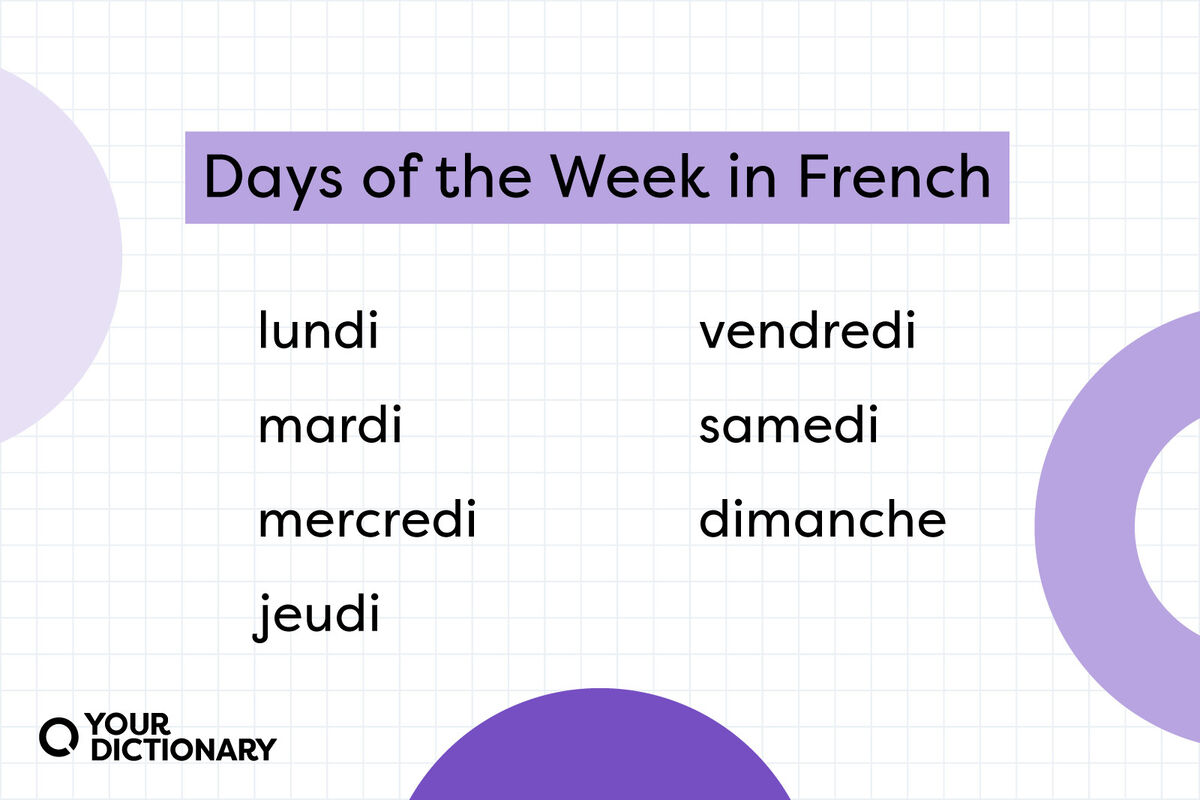
A baguette in one hand, a croissant in the other, and the Eiffel Tower looming behind you — this is the dream if you’re a Francophile, and the first step to achieving that dream is learning French. You need to be able to read a calendar to make future plans with your French friends, so some of the first things you’ll learn are the months of the year and days of the week. These 19 words can be tricky at first, but getting by without them? Baguette about it!
How To Spell and Say the Days of the Week in French
Days of the week is les jours de la semaine (lay joor de la suh-men) in French. Un jour (un joor) is a day, while a week is une semaine (oon suh-men). Unlike in America, the French week starts on Monday, not Sunday. Grammatically, French days aren’t capitalized unless they’re at the beginning of a sentence.
|
Day in English |
Day in French |
Pronunciation |
|
Monday |
lundi |
lun-dee |
|
Tuesday |
mardi |
mar-dee |
|
Wednesday |
mercredi |
mare-cruh-dee |
|
Thursday |
jeudi |
zhu-dee |
|
Friday |
vendredi |
vahn-druh-dee |
|
Saturday |
samedi |
sam-dee |
|
Sunday |
dimanche |
dee-monsh |
Using the Days of the Week in French Sentences
All days of the week are masculine, meaning you have to use le and un when talking about specific days in a French conversation.
- Quel jour sommes-nous aujourd'hui? (What day is today?)
Aujourd'hui, nous sommes vendredi. (Today is Friday.)
- C'est quel jour demain? (What day is tomorrow?)
Demain c'est samedi. (Tomorrow is Saturday.)
- Quel jour étions nous hier? (What day was yesterday?)
Hier c'était jeudi. (Yesterday was Thursday.)
- Quel jour arrivez-vous? (What date are you arriving?)
J'arrive le lundi 1er juin. (I'm arriving on Monday, June 1st.)
- Quel jour partez-vous? (What day are you leaving?)
Je pars le mercredi 3 juin. (I'm leaving on Wednesday, June 3rd.)
How To Say the Months of the Year in French
In French, months is mois (mwah). Thankfully, France uses the same Gregorian calendar used in North America, so the names of their months resemble those in English.
|
Month in English |
Month in French |
Pronunciation |
|
January |
janvier |
jahn-vee-ay |
|
February |
février |
fay-vree-ay |
|
March |
mars |
mahrs |
|
April |
avril |
ah-vreel |
|
May |
mai |
may |
|
June |
juin |
zhoo-ahn |
|
July |
juillet |
zhoo-wee-ay |
|
August |
août |
ah-oot |
|
September |
septembre |
sep-tom-br |
|
October |
octobre |
oc-toh-br |
|
November |
novembre |
no-vom-br |
|
December |
décembre |
day-som-br |
Talking About the Months of the Year in French
Months in French are also masculine, meaning they use le and un and masculine adjectives. Note that the French language puts the day of the month before the month itself. For example, 15 juillet for July 15th.
Similar to days of the week, French does not capitalize the months of the year.
- Quel jour sommes nous aujourd'hui? (What is today's date?)
Aujourd'hui c’est le 25 mars. (Today is March 25th.)
- Quel est votre mois préféré? (What is your favorite month?)
Janvier est mon mois préféré. (January is my favorite month.)
- Quelle est la date de votre naissance? (What date were you born?)
Je suis né le 11 juin. (I was born on June 11th.)
- C'est quand votre anniversaire? (When is your birthday?)
Mon anniversaire est le 4 octobre. (My birthday is October 4th.)
- Est-ce qu'il fait froid en décembre? (Is it cold in December?)
Oui, il fait froid en décembre. (Yes, it is cold in December.)
How To Say and Spell the Seasons in French
France and North America share the same four seasons, so if it’s warm here, it’s warm there. Unfortunately, aside from autumn, the season names sound fairly different.
|
Season in English |
Season in French |
Pronunciation |
|
Spring |
le printemps |
le pran-tom |
|
Summer |
l’été |
l’ay-tay |
|
Autumn |
l’automne |
l’ah-ton |
|
Winter |
l’hiver |
l’ee-vair |
A native French speaker reviewed this content.